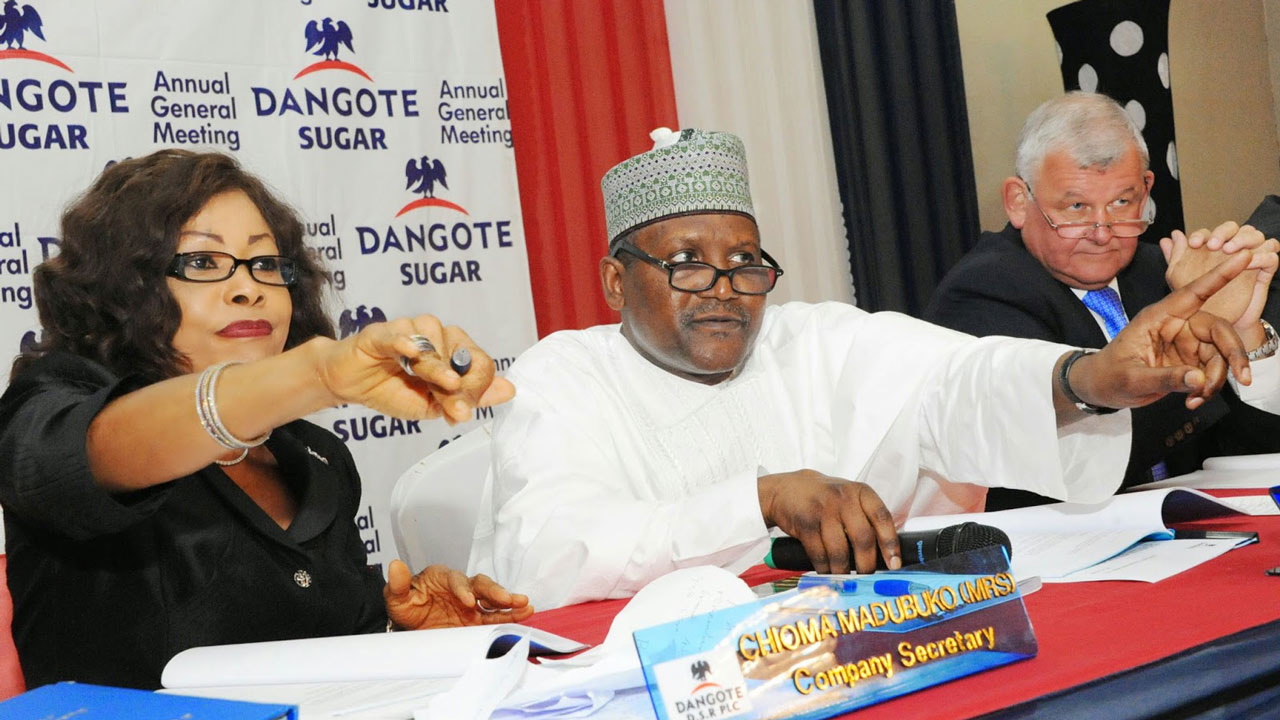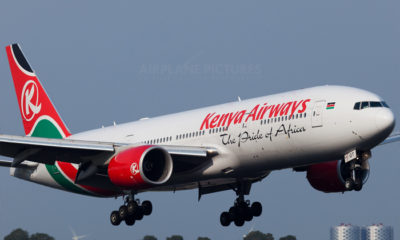Markets
Dangote Sugar Commits to Backward Integration
Published
8 years agoon

- Dangote Sugar Commits to Backward Integration
Dangote Sugar Refinery (DRS) is Nigeria’s largest producer of household and commercial sugar with 1.44 million tonnes of refining capacity. The company was spun out of Dangote Industries in 2006 and got listed on the Nigerian Stock Exchange (NSE) about 10 years ago. With its factory at Apapa, Lagos State, DSR currently imports raw sugar from Brazil and refines it into white, Vitamin A fortified sugar suitable for household and industrial uses.
However, the company’s strategy is to become a global force in sugar production, working within Nigeria’s National Sugar Master Plan to end importation and sell more than 1.5 to 2.0 million metric tonnes of locally produced sugar in Nigeria and neighbouring countries.
In order to successfully execute that strategy, the company is making significant investment in its backward integration programme (BIP). Already, the company’s Savannah cane sugar factory located near Numan, in Adamawa State has an installed factory capacity of 50,000 tonnes.
Covering 32,000 hectares in extent, the Savannah estate has considerable opportunity for expansion which is underway.
Last week, the acting Managing Director/Chief Executive Officer of DSR, Abdullahi Sule told the capital market community that the company would be investing about N106 billion in the next six years to achieve BIP and make Nigeria sugar self-sufficiency.
Impressive financial performance
Despite the economic headwinds in 2016, DSR posted impressive results and has consolidated that performance with improved first quarter (Q1) results ended March 31, 2017. Profit before tax stood at N19.61 billion, up from N16.16 billion, while PAT grew to N14.4 billion as against N11.4 billion in 2015. Earnings per share similarly rose from 93 kobo to 120 kobo. The board of directors of the company recommended a dividend of N7.2 billion, which translates into 60 kobo per share.
Its sugar sales volumes was 778,518 metric tonnes(mt) in 2016, compared with 778,000 mt in 2015. The increase in total revenue by 68 per cent over that of the previous year was predominantly driven by increase in price as just about same volume of 778,518 mt and 778,000 mt were achieved in 2016 and 2015 respectively.
Commenting on the results, Sule said: “We are very pleased with the results for the period under review, our revenue grew by 68 per cent and improve sales volume compared to 2015 despite the current macro-economic challenges. Our focus in the current year and for the future remains leveraging our strengths to maximize every opportunity to generate sales, increase our market share and create sustainable value for our stakeholders.”
He added that concerted efforts are being made towards the actualisation of the company’s BIP.
“The implementation strategy has changed and the full focus is now on the expansion of the Savannah Sugar Estate to its full potential, and development of the new site at Tunga in Nasarawa State,” Sule said.
The company explained that group sugar sales volumes was 778,518 metric tonnes(mt) in 2016, compared with 778,000 mt in 2015.
Sule stated that “Achievement of our BIP plan and growing our market share remains our focus, and efforts are geared towards achievement of effective resource optimisation and cost management; drive for greater efficiency especially in supply chain; human capacity building and route to market redefinition. Others are improved security in the north, consolidation of our position as the largest sugar producer in west African, with 1.5 million MT/PA local sugar production, creation of a robust export market, production of ethanol. And surplus power for supply to national grid and animal feeds production.”
Although investors received a dividend of 60 kobo per share for 2016, the Chairman of DSR, Alhaji Aliko Dangote assured shareholders that the company remained committed to the delivery of superior returns to shareholders.
According to him, the company was in a position to pay a higher dividend but it retained some part of its earnings for investment in the company’s BIP.
“Our focus is the actualisation of our backward integration plans, your board will continue with the effective management of resources to achieve this target, sustainable financial future for the company, and in the turn drive sustainable returns to shareholders,” he said.
Improved First Quarter results
For its first quarter (Q1) result ended March 31, 2017, revenue was up by 83 per cent to N59.5 billion from N32.6 billion in 2016 and 71 per cent of Q1budget achieved.
Cost of sales went up 100 per cent, due to increase in gas, gross profit increased 16 per cent to N7.84 billion as against N6.77 billion. Gross profit rose to N7.84 billion, from N6.77 billion.
Profit before tax increased 28 per cent to N7.04 billion, while profit after tax went up to N4.76 billion from N3.34 billion in 2016, indicating a growth of 42.5 per cent.
Analysts’ comments
According to analysts at Cordros Capital, DSR’s revenue and PAT beat their estimates by 16 per cent and eight per cent respectively.
“Annualised, revenue and PAT are above consensus by 30.9 per cent and 1.4 per cent respectively. The revenue growth was driven by the significantly higher average price (121 per cent), which more than compensated for relatively lower sales volume (17 per cent). Management said it sold 174,981 tonnes of sugar during the period, seven per cent more than the 164,129 tonnes achieved in Q4-16, and 13 per cent above our estimate,” they said.
Cordros Capital said the quarter/quarter (q/q) volume growth is consistent with the encouraging demand the management guided to during the 2016FY conference call.
“That said, the management’s reported average selling price of N17,010/50kg bag is above our computed N16,775/bag, and is not consistent with the N1,000/bag reduction (implemented in March) from the N17,000/bag as at end of 2016. Also positively impacting PAT was the significant increase in investment income (N971.4 million vs. N7.1 million in Q1-16), enabled by growing cash generation, and consequent investments in short term money market instruments (N40.3 billion). Management said it earned 11.5 per cent (vs. 7 per cent in Q1-16) average interest on its bank deposits,” they said.
The analysts noted that although gross margin improved from the trough of 7.3 per cent in Q4-16, the 13.2 per cent realized during the period was significantly shy of the 20 per cent guided by management, and lower than their 14.7 per cent estimate.
“Management had cited the purchase of forex at a relatively lower average rate (compared to Q4-2016) and higher output from Savannah where margins are higher, as the potential enablers of margin recovery. Overall, DSR Q1-17 PAT is consistent with our strong growth expectation (22 per cent) for 2017F. We look for lower PAT growth in subsequent quarters as narrowing y/y price differential (with sales volume unlikely to improve significantly from current level) forces revenue growth to taper. We maintain HOLD rating on the stock,” they said.
Similarly, analysts at FBN Quest said the strong sales growth more than offset the negative impact of a gross margin contraction of -758bps y/y to 13.2 per cent and opex growth of 29 per cent, leading to the improvement in profitability.
“PAT was up by 43 per cent due to a comparatively lower effective tax rate of 32.4 per cent compared with 34.7 per cent in the corresponding quarter of 2016. Sugar price increases over the last 12 months were the primary driver behind the sales growth recorded during the quarter as the company pushed through increasing production costs. We estimate that prices were raised by around 75 per cent over the period from c.N7,500/50kg of finished sugar. Higher imported raw sugar (a key raw material) prices were the primary driver behind the gross margin contraction,” they said.
The explained that compared with their forecasts, sales were ahead by 23 per cent, while PBT and PAT were broadly in line.
“A negative surprise on the gross margin line was completely offset by positives on both the opex and other income lines. DSR’s sales and PBT are tracking ahead of consensus’ sales and PBT estimate of N181.
billion and N22.5 billion respectively, as such we expect upward adjustments to consensus 2017E estimates. Looking ahead, DSR’s focus remains its backward integration projects,” FBN Quest said.
Is the CEO and Founder of Investors King Limited. He is a seasoned foreign exchange research analyst and a published author on Yahoo Finance, Business Insider, Nasdaq, Entrepreneur.com, Investorplace, and other prominent platforms. With over two decades of experience in global financial markets, Olukoya is well-recognized in the industry.

You may like
-
Trump’s 14% Tariff on Nigerian Imports Raises Fresh Concerns for Trade and Economic Stability
-
Nigeria Secures $1.08 Billion World Bank Support to Boost Education and Combat Malnutrition
-
Trump Declares Economic Emergency Introduces Tariffs on Nigerian Exports
-
Nigeria, Brazil Partner on $1.1bn Agricultural Revolution Plan
-
Nigeria Considers Creation of 31 New States Despite Economic Challenges
-
Visa Denial Sparks Airport Drama as Kenya Airways Defends Staff













